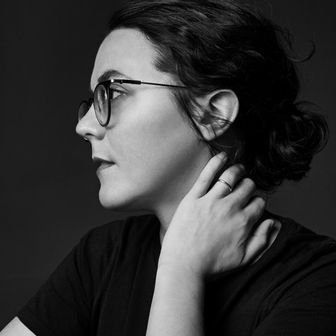
When my son was about a month old, a dear friend gave me Far From the Tree by Andrew Solomon. This strikes me now, just a few years later, as darkly hilarious: I’d love to cackle alongside another mother who received the same new-baby gift and thought, Not a great sign. I mean, what better way to acknowledge a freshly diagnosed genetic disease than with a 1,000-page book about parenting atypical children?
The cover of Far From the Tree features a back-lit infant sprawled in what look like cells, as if struggling to stay afloat in a mix of genetic material like the kind I’d just learned would doom my son. Dutifully, I read Solomon’s work while my son ate, while he napped, while he waved his arms from his perch on a brightly colored pillow. The whole time, my son’s cells were working — or not working — in ways disastrously different from my own. Cystic fibrosis appears in the book as an aside, when Solomon mentions meeting a woman who died of CF when she was 22. Like my son, she had parents who do not have the disease, which gave her a “horizontal identity,” Solomon’s term for the category of being profoundly different from your parents.
Now, the filmmaker Rachel Dretzin has adapted Solomon’s book into a documentary of the same name, which opened in select theaters July 20. Using ten years’ worth of research and interviews with hundreds of families, Solomon’s book explores a wide range of conditions that affect family life; it’s divided into chapters called Deaf, Dwarf, Autism, Schizophrenia, Disability, Prodigies, Rape, Crime, and Transgender, with Son and Father serving as bookends. The documentary’s focus is much narrower — concentrating on just six families and covering Down syndrome, autism, dwarfism, a son who committed murder, and Solomon’s own story. Solomon says the impetus for his work was the experience of coming out as gay to his straight parents, who did not take the news well. I loved the book; I loved the documentary adaptation. But the idea of drawing firm conclusions about the kinds of families and lives they depict makes me uneasy.
While Solomon’s book includes the perspectives of many, many families (alongside direct exposition, and occasional philosophy on the conditions it depicts), the documentary version offers individual family portraits. The voices of parents and children tell their own stories without outside commentary, and film gives Solomon’s project room to fill in visual details where language might fall short. Both the book and the documentary are just as moving as you’d expect — with moments of honesty, unquenchable sadness, triumph, tenderness, and vast, overwhelming instances of difficulty and pain.
The film does not shy away from those joyless moments. I nodded in recognition at the father who spoke of force-feeding his young son “an awful little slurry” of medication, and cried watching that same boy hit his mother. But the documentary is also a visual tribute to the beautiful mundanity of daily life: an autistic child and his father walk through their snowy neighborhood in matching red beanies, thwacking mailboxes all along the way. A man with Down syndrome sings along to Frozen, flipping his Elsa cape off his shoulders in solidarity with what he sees on the screen. The sense of intimacy is powerful; these are scenes that could occur in any family, no matter how “different.”
Still, I remain puzzled with certain aspects of Solomon’s overall project — I’m not quite as sure as he seems to be that accepting a child is the same as accepting their condition. According to Solomon, “Many parents experience their child’s horizontal identity as an affront.” Ideally, tolerance, acceptance, and celebration will come next. But when applied to conditions as distinct from each other as those documented in the book and the film, this trajectory doesn’t always make sense.
As the parents of atypical children, do we struggle to accept our atypical children, or do we struggle to accept the condition that makes them such? For me, anyway, love, tolerance, and acceptance have never been anything but a given, when it comes to my son. I struggle with his illness — I’ve never struggled with him. In the film, the mother of a man with Down syndrome describes this feeling in terms of attachment: “You have spent nine months forming an attachment,” she says, using her hands to outline a pregnant belly. “What did they think this was?”
What Solomon’s project (both the book and the movie) gestures at is the question of whether you can separate a child’s condition from that child. What if I love my child but hate this illness, which is a condition he was born into and cannot part with? Is that an example of wishful cherry-picking and a failure of acceptance, or the natural feelings of a parent who abhors their child’s suffering? “It is not a joyful thing, by any means, to have a special-needs child,” Solomon’s book quotes the mother of a disabled child as saying. “But Max, himself, has given us a lot of joy.” Like many parents of atypical children, I’m uncomfortable claiming any sort of joy or benefit from my child’s condition, since that condition is also capable of killing him. This is not true of all the conditions Solomon has documented, which is why his steps — tolerance, acceptance, celebration — don’t seem so straightforward to me.
While the film creates more room for the families it documents to be fully realized, Solomon’s own presence is more nuanced in his book. In the “Father” chapter, he describes his son’s early health scare: “I felt two conflicting guilts: first that I had produced a child who might suffer, and second that despite all the stories that I’d heard from parents who found deep meaning in bringing up exceptional children, I didn’t want to join their number.” This is a rare departure from Solomon’s commitment to collecting evidence about the rewards of parenting atypical children; just a few pages later, he concludes with a statement about the parents he’s met: “I was startled to learn that my research had built me a plank, and that I was ready to join them on their ship.” Witnessing Solomon’s internal wavering is more powerful than any of his firm conclusions, because it’s perfectly indicative of the paradoxes and contradictions of parenthood itself.
There’s not a lot about raising children that makes sense, when it’s viewed from the outside. This is only amplified when the child you’re raising is different in some way that can make life difficult. To me, the most illuminating scene arrived early in the documentary. A mother and her son, who has Down syndrome, walk along a wintry street. “Where is everybody? We are the last people on the planet,” she whispers. “Helloooooo,” her son says, drawing out the syllables. His mother chuckles, and they keep walking, side-by-side. Voice-over explaining his birth and diagnosis begins before they reach their destination.
The brief times when a parent-child relationship is in a vacuum — those are the moments everything makes the most sense. It’s when you have to explain yourselves to the rest of the world, for a book, in a film, or just during a trip to the grocery store, that things get a lot more complicated. Alone together is the one place where difference doesn’t have to be celebrated or tragic, beautiful or painful, infused with meaning or reeking of senselessness. It’s just present, between parent and child.





